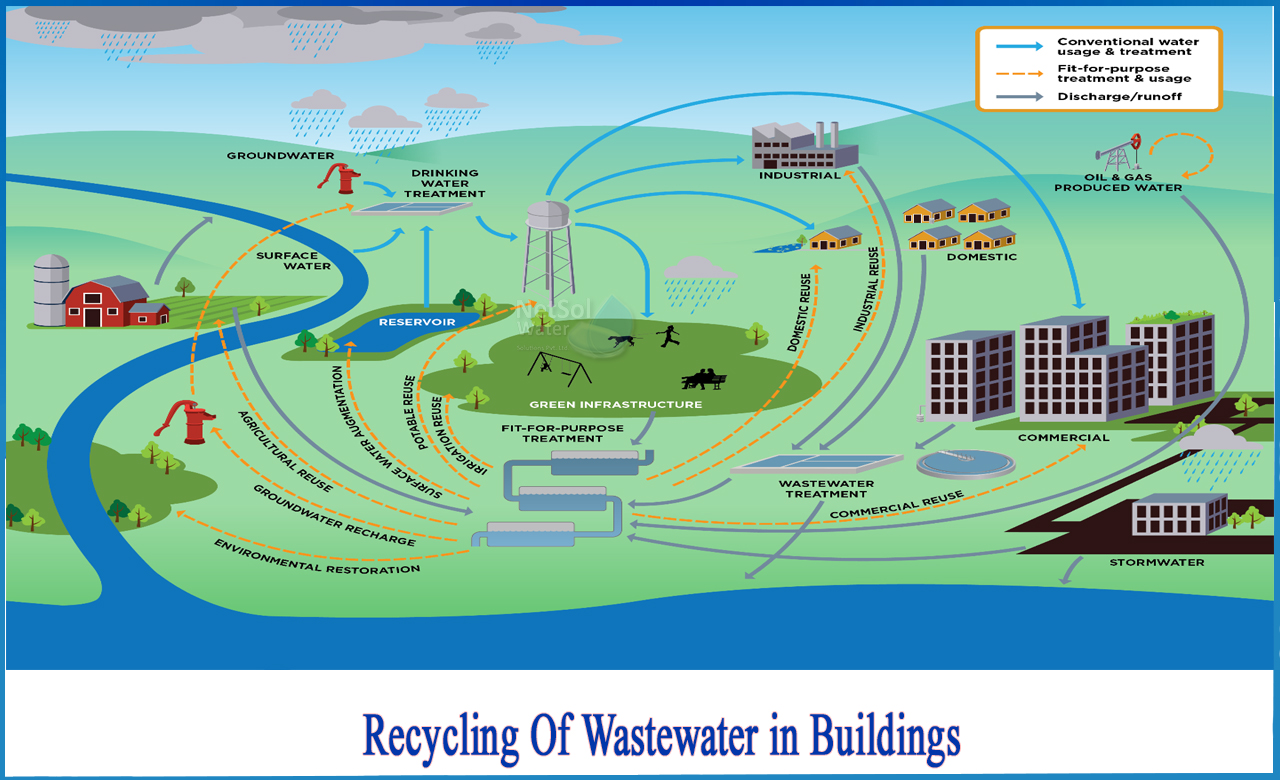What is water recycling or water reuse or water reclamation?
Water reuse (also known as water recycling or water reclamation) is the process of reclaiming water from various sources and then treating and reusing it for beneficial purposes such as agriculture and irrigation, potable water supplies, groundwater replenishment, industrial processes, and environmental restoration. Water reuse can supplement existing water supplies and improve water security, sustainability, and resilience.
Water reuse can be classified as either planned or unplanned. Unintentional water reuse refers to situations in which a source of water is largely made up of previously used water.
Water recycling is the process of treating and reusing wastewater for another purpose, such as agricultural irrigation or industrial processes. Recycled wastewater can be used to flush toilets as well as replenish groundwater levels.
This method is effective and can save businesses money, but how secure is it and how simple is it to implement?
Let us get into details!
Where can I recycle my wastewater?
Engineers with expertise in groundwater treatment solutions are required for safe groundwater treatment. Depending on the source of the water and the intended use of the wastewater, the wastewater recycling process involves a combination of technologies. Some recycling methods, such as toilet flushing, are low-level processes, whereas wastewater destined for agricultural land will require more treatment.
Gray water is waste water from washing machines and dishwashers that may contain food particles. It excludes feces, which is present in black water and necessitates a more intensive recycling process.Gray water can be effectively treated using activated charcoal filters connected to a pump. They can remove inorganic and organic chemicals, but they are expensive to install in a plumbing outlet.
Aerobic biological treatment, which involves pumping oxygen into water storage tanks, is another method used in wastewater recycling. Beneficial bacteria in the wastewater can be destroyed using aerobic biological treatment. Building-mounted storage tanks are an option.
Water Reuse Types
Municipal wastewater, industrial process and cooling water, stormwater, agricultural runoff and return flows, and produced water from natural resource extraction activities are all potential sources of water for reuse. These water sources have been adequately treated to meet "fit-for-purpose specifications" for a specific next use.
"Fit-for-purpose specifications" are the treatment requirements that must be met in order to bring water from a specific source to the required quality, in order to ensure public health, environmental protection, or specific user needs. For example, reclaimed water used for crop irrigation must be of sufficient quality to protect plants and soils, maintain food safety, and protect farm workers' health. Water may require more treatment in applications where there is a higher risk of human contact.
Recycled Water Applications
· Agriculture irrigation
· Irrigation for landscape purposes, such as parks, rights-of-way, and golf courses
· Water supply for the city
· Power plants, refineries, mills, and factories all use process water
· Indoor applications include toilet flushing
· Surface cleaning or dust control on roads, construction sites, and other heavily trafficked areas
· Concrete mixing and other building processes
· Providing water to artificial lakes and inland or coastal aquifers
· Restoration of the environment
How to construct a water recycling system?
Integrating a wastewater recycling system into a building necessitates some planning as well as the expertise of qualified engineers or water treatment consultants who are familiar with groundwater treatment solutions. You'll need to think about how to recycle the water as well as the methods you'll need to incorporate into the building. The majority of buildings use a combination of two methods for filtering grey water for reuse:
The first step is to conduct an assessment, and then to plan where the system will be installed within the building. Depending on the method, it may require storage space. In order to ensure that a water recycling system is integrated into the design of a building, it should be installed while the plans are being developed. Water recycling systems can also be installed in older structures.
Netsol Water is Greater Noida-based leading water & wastewater treatment plant manufacturer. We are industry's most demanding company based on client review and work quality. We are known as best commercial RO plant manufacturers, industrial RO plant manufacturer, sewage treatment plant manufacturer, Water Softener Plant Manufacturers and effluent treatment plant manufacturers. Apart from this 24x7 customer support is our USP. Call on +91-9650608473, or write us at enquiry@netsolwater.com for any support, inquiry or product-purchase related query.



